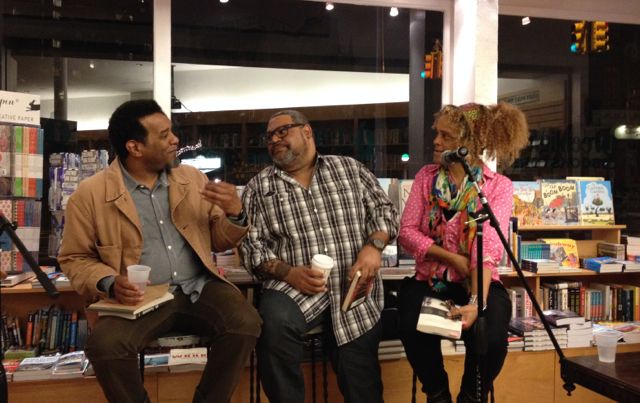
Bernadine Evaristo launched her latest novel, Mr. Loverman, at Greenlight Bookstore in Brooklyn. She was joined by Chris Abani who read from his latest novel, The Secret History of Las Vegas (January 2014). Colin Channer facilitated the discussion.
Channer began by describing both authors as “bi-textuals” because they each have flirted with poetry as well as fiction. He asks them how they both found themselves as cross-genre writers.
Evaristo explains that she began with theater leading her to create a verse-novel. Eventually she did transition into writing straight up novels because, “it was always about telling stories with me.” Her novels are often described as poetic and lyrical.
Abani came from the opposite angle. He started as a novelist, but decided he wanted a spot in a writing workshop. The problem he faced was that it was a poetry workshop. To earn a spot, he had to write poems. He says Evaristo, who was also in the workshop with him, was the one who called him out on his poems when they failed to be poetic.
Channer asks Evaristo how the plot and story of Mr. Loverman came about. She says she began writing in the voice of an old Caribbean man. She wanted to write the character. She focused on the voice. “I felt there was pressure to make the voice authentic,” she adds.
From the voice, the rest of the story evolved. Barrington is an older gay man, but one who is married. He carries on his sex life with his longtime friend despite a wife who knows nothing about the arrangement.
There are times when the character slips out of the Caribbean–and rightfully so. Barrington has spent decades in England. Evaristo says her publisher didn’t understand that slipping in and out of the accent was entirely natural.
“I like to inhabit my characters,” she adds.
Still, she adds she wanted to avoid alienating her readers.
She then reads a section of the novel.
Evaristo engages in politics. But her protagonist is different. He is gay and black, but he never feels that he has suffered. He is not a victim. As a real estate developer, he has been a success financially in Britain.
“With every book I write, I’m ready for someone to go at me,” Evaristo says.
Channer asks about the sex in the book. In her other books, she offers lurid sex scenes.
Evaristo says the sexiest bits occur when Barrington’s wife has an affair. She does not focus on the gay sex. But in this novel, its really more about older people enjoying their sex lives than any particular type of sex.
Channer moves the discussion towards cities. Both Abani and Evaristo have novels that very much exist in specific cities. Mr. Loverman plays out across London while Abani’s novel is tied to Las Vegas.
Abani says that Las Vegas was one of the first cities his friends took him to when he moved to the United States. It is a city that reminds him of Nigeria because its a place that acquires the identity of other places. Las Vegas wants an Eiffel Tower–Las Vegas builds an Eiffel Tower. Its a very Nigerian way to build cities, he says.
Also, he adds, Nigerians like to build cities where there is no water, just like Vegas.
Las Vegas fascinates him because its a city full of properness, yet anything goes. There is an illusion of freedom created in Las Vegas, but its all very tightly controlled by security.
“England has a way of preserving detritus that makes no sense,” he says.
London offers something else, Evaristo says. While it doesn’t stifle creativity, there are problems. There is a growing underclass and anti-racism lobby doesn’t exist as it does in the United States leading to growing class tension.
Still, she does offer hope; writers are well supported in Britain.